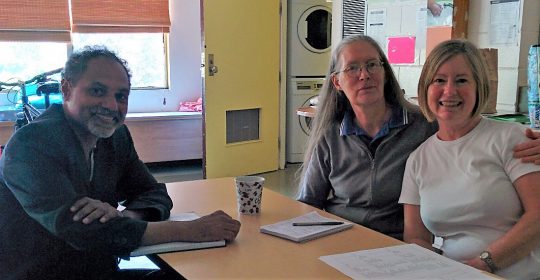
Built on Trust
On the occasion of her recent retirement we are posting a piece originally published in the April 2017 edition of the FSA Voice.
Dorothy Cumming, FSA Member, Faculty, Nursing. In conversation with Kyla Epstein, FSA Member Engagement Officer.
 “As an educator I wouldn’t trade this for the world.” Minutes into a conversation with Dorothy Cumming you can tell she means it. As an instructor in the Community Health Nursing clinical course at BCIT, Dorothy supervises nursing students placed in the Downtown Eastside (DTES) in Vancouver. The students are placed in agencies such as First United, Robert and Lily Lee Family Community Health Centre, Powell Street Getaway, and the Strathcona Community Centre and Elementary School. InSite, the first legal supervised drug injection site in North America and an organization focusing on harm reduction, also provides observation shifts for students.
“As an educator I wouldn’t trade this for the world.” Minutes into a conversation with Dorothy Cumming you can tell she means it. As an instructor in the Community Health Nursing clinical course at BCIT, Dorothy supervises nursing students placed in the Downtown Eastside (DTES) in Vancouver. The students are placed in agencies such as First United, Robert and Lily Lee Family Community Health Centre, Powell Street Getaway, and the Strathcona Community Centre and Elementary School. InSite, the first legal supervised drug injection site in North America and an organization focusing on harm reduction, also provides observation shifts for students.
Placing students in these agencies and in this neighbourhood requires Dorothy to build relationships centered on trust with the agency staff and the members of the community; and the same is expected of the students. This work is predicated on the understanding that this trust needs to be earned; that Dorothy and her students aren’t going to let people down and can be counted on to do what they say they will. She finds that her students understand these expectations and don’t want to disappoint the agencies or the community.
Dorothy Cumming came to BCIT in 2002 and in 2008 was tasked to look for new clinical placements for students. Dorothy’s previous clinical experiences didn’t provide her with an avenue to considering the DTES as a possible clinical environment. Through a connection with long-time advocate Judy Graves at a forum on poverty and homelessness, Dorothy was introduced to agencies in the DTES and worked hard, with Judy’s support, to build the trust needed to place BCIT students. She has also had to work over the years to ensure that everyone at BCIT understands that it is appropriate for her to work in the DTES, and that it is not a threatening environment but rather a space where the full scope of community health nursing can be practiced.
“How do you teach compassion? It has to start from a nugget and then grow. This work is that nugget.”
Some students who come into this rotation start unprepared and uncertain, some start curious, and some (a minority) have been waiting their entire education for this. Their theory gets put into practice – relational practice – where their unconscious assumptions and biases get tested and students are regularly blown away by the strength, resilience, generosity, authenticity, and humour of the community. This requires communication and relationship skills to be intertwined and the results have been significant. Students who experience working within the DTES community have a chance to open their hearts and ears. They often start out one way and leave different and they are able to name that difference. A shift happens and a change takes place in the framing that we often have about ‘certain people’ as well as the language used to describe them. Students are able to focus on the stories that people carry with them, and to learn more about the human side of nursing. They learn that individual choice is often severely compromised or limited from a very young age.
 Dorothy and the students she supervises concentrate on using a strengths-based lens and on the social determinants of health (SDOH). They seek to expand their focus beyond a specific wound, injury, disease, lifestyle, or behaviour, to emphasize the promotion of health that considers the community conditions related to accessing housing, food and water provision, bathrooms, and additional financial resources.
Dorothy and the students she supervises concentrate on using a strengths-based lens and on the social determinants of health (SDOH). They seek to expand their focus beyond a specific wound, injury, disease, lifestyle, or behaviour, to emphasize the promotion of health that considers the community conditions related to accessing housing, food and water provision, bathrooms, and additional financial resources.
